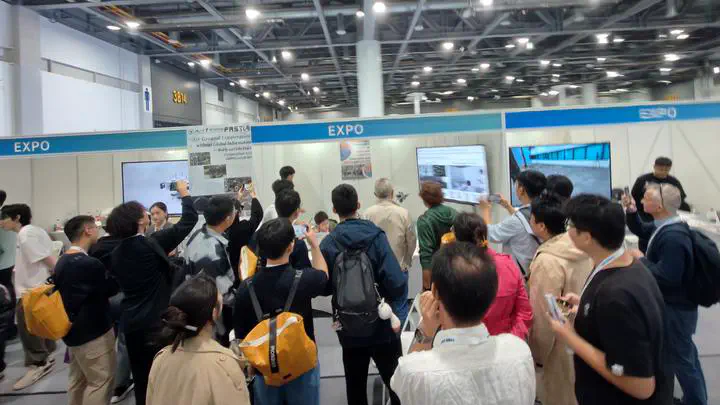FAST-FIRE@IROS2025

Our laboratory achieved remarkable success at the 2025 IEEE/RSJ International Conference on Intelligent Robots and Systems (IROS) held in Hangzhou from October 19 to 25, marking a fruitful journey of our research demonstration, academic paper presentation, and academic reunions.

The highlight began on the first day of IROS EXPO, where our team hosted a dynamic booth for “Air-Ground Cooperation without Global localization: RoFly and CubeTrack Cooperation with CREPES and CoNi-MPC”. Thanks to the hard work and excellent technique skills from Zhehan Li, Jiajun Yu, Jiadong Lu, and other teammates, the live demonstration ran super successfully. We gave a demonstration every half hour, each time attracting great interest from researchers and industry professionals both domestically and internationally. The audience was particularly curious about how these two robots could achieve such efficient collaboration without SLAM inside. Jiadong Lu and Jiajun Yu enthusiastically explained CREPES and CoNi-MPC to them, revealing the secrets of the system.

On October 23rd in the Mapping track, Zhenyu Hou delivered an excellent oral presentation that sparked lively discussions among many field robotics experts. Terrain analysis is critical for deploying ground mobile robots in real-world tasks, especially in outdoor, unstructured environments. We propose a novel spatio-temporal traversability assessment method that enables autonomous robots to navigate complex terrains effectively. Our approach uses feature-based sparse Gaussian processes (FSGP) to extract geometric features (curvature, gradient, elevation, etc.) directly from point-cloud scans. Then we design a spatio-temporal Bayesian Gaussian kernel (BGK) inference method to dynamically evaluate traversability scores by integrating historical and real-time data while accounting for slope, flatness, gradient, and uncertainty.

Thanks to the IROS event, our team had the opportunity to have a pleasant reunion with the MISTLab team at Polytechnique Montréal, UdeM. We invited Professor Giovanni Beltrame and his team to visit our lab at the Huzhou Institute of Zhejiang University. We held a meeting to share our research mission and latest results. Junchen Chen presented his learning-based method for depth complementarity and feature matching with Time-of-Flight (ToF) sensors, which has gained great attention from Giovanni. Finally, we enjoyed a sumptuous barbecue dinner and Chinese Baijiu.

About MISTLab: The Making Innovative Space Technology Lab (MISTLab) at Polytechnique Montréal, led by Prof. Giovanni Beltrame, focuses on multi-robot systems and swarm robotics, autonomous perception–planning–control, embedded AI, and field deployments across aerial, ground, and space platforms. The group collaborates broadly with academia and industry and actively shares open-source tools and research outcomes with the community.